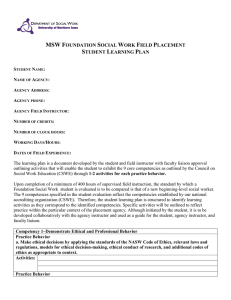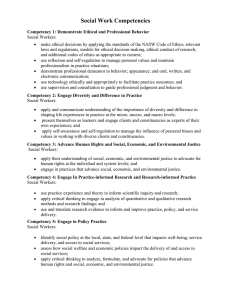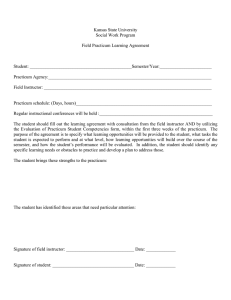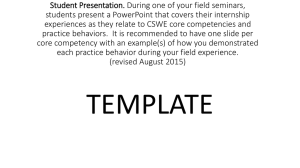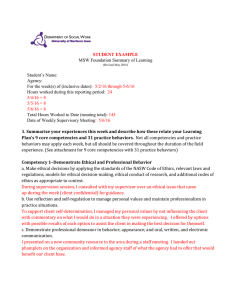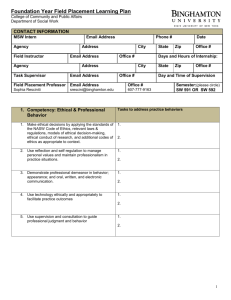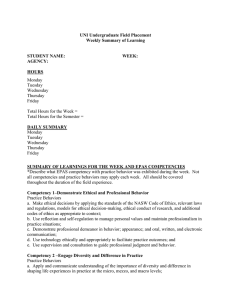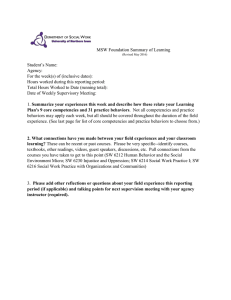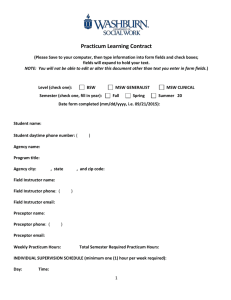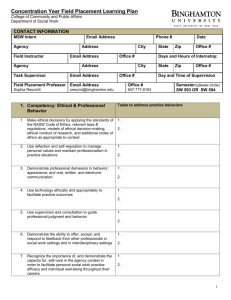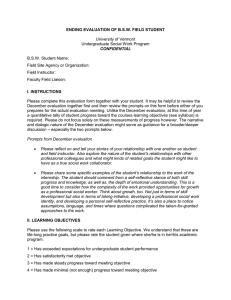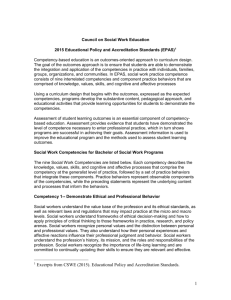senior field learning contract
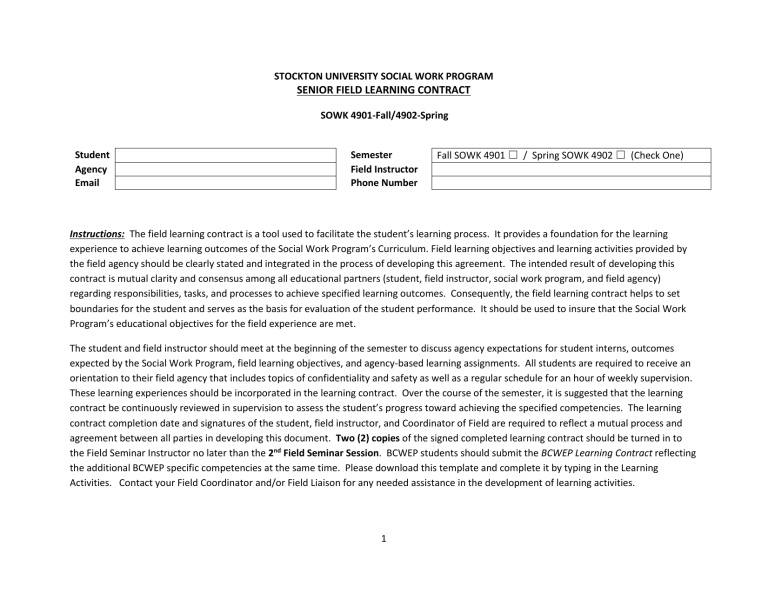
STOCKTON UNIVERSITY SOCIAL WORK PROGRAM
SENIOR FIELD LEARNING CONTRACT
SOWK 4901-Fall/4902-Spring
Student Semester Fall SOWK 4901 ☐ / Spring SOWK 4902 ☐ (Check One)
Agency
Field Instructor
Phone Number
Instructions: The field learning contract is a tool used to facilitate the student’s learning process. It provides a foundation for the learning experience to achieve learning outcomes of the Social Work Program’s Curriculum. Field learning objectives and learning activities provided by the field agency should be clearly stated and integrated in the process of developing this agreement. The intended result of developing this contract is mutual clarity and consensus among all educational partners (student, field instructor, social work program, and field agency) regarding responsibilities, tasks, and processes to achieve specified learning outcomes. Consequently, the field learning contract helps to set boundaries for the student and serves as the basis for evaluation of the student performance. It should be used to insure that the Social Work
Program’s educational objectives for the field experience are met.
The student and field instructor should meet at the beginning of the semester to discuss agency expectations for student interns, outcomes expected by the Social Work Program, field learning objectives, and agency-based learning assignments. All students are required to receive an orientation to their field agency that includes topics of confidentiality and safety as well as a regular schedule for an hour of weekly supervision.
These learning experiences should be incorporated in the learning contract. Over the course of the semester, it is suggested that the learning contract be continuously reviewed in supervision to assess the student’s progress toward achieving the specified competencies. The learning contract completion date and signatures of the student, field instructor, and Coordinator of Field are required to reflect a mutual process and agreement between all parties in developing this document. Two (2) copies of the signed completed learning contract should be turned in to the Field Seminar Instructor no later than the 2 nd Field Seminar Session. BCWEP students should submit the BCWEP Learning Contract reflecting the additional BCWEP specific competencies at the same time. Please download this template and complete it by typing in the Learning
Activities. Contact your Field Coordinator and/or Field Liaison for any needed assistance in the development of learning activities.
1
Competencies and Practice
Behaviors (the student will be able to...)
Learning Activities (the student will achieve this by….)
Must be SMART
Must have at least 2 Activities for Each Competency
Competency 1: Demonstrate Ethical and Professional Behavior
Practice Behavior 1: Make ethical decisions by applying the standards of the NASW Code of Ethics, relevant laws and regulations, models for ethical decision-making, ethical conduct of research, and additional codes of ethics as appropriate to context .
Practice Behavior 2: Use reflection and self-regulation to manage personal values and maintain professionalism in practice situations.
Practice Behavior 3: Demonstrate professional demeanor in behavior; appearance; and oral, written, and electronic communication.
Practice Behavior 4: Use technology ethically and appropriately to facilitate practice outcomes.
Practice Behavior 5: Use supervision and consultation to guide professional judgment and behavior.
2
Target
Date
Competency 2: Engage Diversity and Difference in Practice
Practice Behavior 6: Apply and communicate understanding of the importance of diversity and difference in shaping life experiences in practice at the micro, mezzo, and macro levels.
Practice Behavior 7: Present themselves as learners and engage clients and constituencies as experts of their own experiences.
Practice Behavior 8 : Apply selfawareness and self-regulation to manage the influence of personal biases and values in working with diverse clients and constituencies.
Competency 3: Advance Human Rights and Social, Economic, and Environmental Justice
Practice Behavior 9: Apply their understanding of social, economic, and environmental justice to advocate for human rights at the individual and system levels.
Practice Behavior 10: Engage in practices that advance social, economic, and environmental justice.
3
Competency 4: Engage in Practice-informed research and Research-informed Practice
Practice Behavior 11 : Use practice experience and theory to inform scientific inquiry and research.
Practice Behavior 12 : Apply critical thinking to engage in analysis of quantitative and qualitative research methods and research findings.
Practice Behavior 13 : Use and translate research evidence to inform and improve practice, policy, and service delivery.
Competency 5: Engage in Policy Practice
Practice Behavior 14: Identify social policy at the local, state, and federal level that impacts well-being, service delivery, and access to social services.
Practice Behavior 15: Assess how social welfare and economic policies impact the delivery of and access to social services.
Practice Behavior 16: Apply critical thinking to analyze, formulate, and advocate for policies that advance human rights and social, economic, and environmental justice.
4
Competency 6: Engage with Individuals, Families, Groups, Organizations, and Communities
Practice Behavior 17: Apply knowledge of human behavior and the social environment, person-in-environment, and other multidisciplinary theoretical frameworks to engage with clients and constituencies.
Practice Behavior 18: Use empathy, reflection, and interpersonal skills to effectively engage diverse clients and constituencies.
Competency 7: Assess Individuals, Families, Groups, Organizations, and Communities
Practice Behavior 19: Collect and organize data, and apply critical thinking to interpret information from clients and constituencies.
Practice Behavior 20: Apply knowledge of human behavior and the social environment, person-in-environment, and other multidisciplinary theoretical frameworks in the analysis of assessment data from clients and constituencies.
Practice Behavior 21: Develop mutually agreed-on intervention goals and objectives based on the critical assessment of strengths, needs, and challenges within clients and constituencies.
Practice Behavior 22: Select appropriate intervention strategies based on the assessment, research knowledge, and values and preferences of clients and constituencies.
5
Competency 8: Intervene with Individuals, Families, Groups, Organizations, and Communities
Practice Behavior 23: Critically choose and implement interventions to achieve practice goals and enhance capacities of clients and constituencies.
Practice Behavior 24: Apply knowledge of human behavior and the social environment, person-in-environment, and other multidisciplinary theoretical frameworks in interventions with clients and constituencies.
Practice Behavior 25 Use interprofessional collaboration as appropriate to achieve beneficial practice outcomes.
Practice Behavior 26: Negotiate, mediate, and advocate with and on behalf of diverse clients and constituencies.
Practice Behavior 27: Facilitate effective transitions and endings that advance mutually agreed-on goals.
Competency 9: Evaluate Practice with individuals, Families, Groups, organizations, and Communities
Practice Behavior 28: Select and use appropriate methods for evaluation of outcomes .
Practice Behavior 29: Apply knowledge of human behavior and the social environment, person-in-environment, and other multidisciplinary theoretical frameworks in the evaluation of outcomes.
6
Practice Behavior 30: Critically analyze, monitor, and evaluate intervention and program processes and outcome.
Practice Behavior 31: Apply evaluation findings to improve practice effectiveness at the micro, mezzo, and macro levels.
Student Signature: _____________________________________________
Date: _____________________________________________________
Field Instructor Signature: _______________________________________
Date: ____________________________________________________
Coordinator of Field Signature: ___________________________________
Date: ____________________________________________________
7
